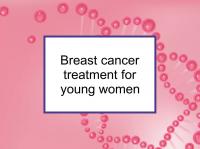A new Finnish study has reported that five-year survival for breast cancer patients 35 years old or younger has improved but is still less favorable than for other breast cancer patients. The study was designed to investigate the characteristics, treatment, and prognosis of very young women with breast cancer.
The women were followed for a median of 78 months. A total of 117 (55%) of the women had positive lymph nodes and 14 (7%) had distant metastases at diagnosis. Eighty-one (38%) tumors were hormone receptor negative and 130 (61%) were grade 3. Forty-seven (34%) of the 137 tumors for which HER2 status was known overexpressed HER2 and 35 (26%) were triple negative (ER-/PR-/HER2-).
A total of 140 of the women were treated with mastectomy and 68 had breast conserving surgery (typicall, lumpectomy). 163 of the women received radiotherapy after surgery, 175 received chemotherapy, 95 received endocrine therapy (typically, tamoxifen) and 18 of the HER2+ patients were given trastuzumab (Herceptin). A total of 63 patients experienced a recurrence during follow up, of whom 20 had a locoregional recurrence (recurrence in the breast, chest wall, or lymph nodes).
Ten (15%) of the women who had breast conserving surgery experienced a recurrence in the same breast that had been treated whereas eight (6%) of the women who had mastectomies experienced a chest wall recurrence on the same side as the original tumor. Seven of these eight women had not received postmastectomy radiotherapy. The disease-free interval was found to be shorter in women with hormone receptor positive tumors. A total of 44 (21%) of the women had died as of the end of follow up. The five-year overall survival was 80%.
The authors conclude that five-year survival for young women with breast cancer has improved but is still worse than that of other breast cancer patients.
Radiotherapy after mastectomy appears to increase survival
The survival outcomes for the women in this study were somewhat less favorable than reported in some other recent studies, possibly reflecting less aggressive treatment than what is now customary in the U.S. For example, 131 of the women were hormone receptor positive, yet only 95 received anti-estrogen therapy. In fact, lack of endocrine treatment might account for the surprising finding that the disease-free interval (time to progression) was shorter for these women. One notable study finding was that radiotherapy after mastectomy appears to provide a significant survival advantage for young breast cancer patients.
Please see our articles on the latest research on breast cancer in very young women and how young breast cancer survivors can avoid a recurrence for more information.
